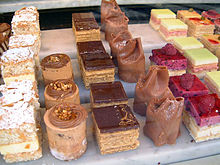Petit four: Difference between revisions
No edit summary |
No edit summary |
||
| Line 6: | Line 6: | ||
A '''petit four''' (plural: '''petits fours''') is a small [[cake]] generally eaten at the end of a meal or served as part of a large [[buffet]]. The name is from the [[French language|French]] ''petit four'', meaning "small oven". |
A '''petit four''' (plural: '''petits fours''') is a small [[cake]] generally eaten at the end of a meal or served as part of a large [[buffet]]. The name is from the [[French language|French]] ''petit four'', meaning "small oven". |
||
Modern petits fours usually consist of a geometrically cut piece of sponge cake, topped with [[fondant]] and are approximately 25 millimetres square and about 40 millimetres high. The fondant which tops the cake is often pastel in color, and are commonly [[cake decorating|decorated]] with piped icing flowers or other sugar embellishments. The term ''petit four'' may also, however, refer to any of a variety of small [[confection]]s, especially in France. |
|||
Commercially made petits fours, especially those soldin the United States, are often filled with [[buttercream]] icing. |
|||
There are two different categories of petits fours. ''Petits fours secs'' (''sec'' meaning "dry") include a variety of small [[desserts]], such as special dainty [[cookies]], baked [[meringue]]s, [[macaroons]], and [[Puff pastry|puff pastries]]. ''Petits fours glacés'' (''glacé'' meaning "iced") are iced or [[cake decorating|decorated]] in some way, such as tiny cakes covered in fondant or frosting, small [[Éclair (pastry)|éclair]]s, and tartlets. In a French patisserie, assorted small desserts are usually called mignardises, while hard, buttery cookies are called petit fours. |
There are two different categories of petits fours. ''Petits fours secs'' (''sec'' meaning "dry") include a variety of small [[desserts]], such as special dainty [[cookies]], baked [[meringue]]s, [[macaroons]], and [[Puff pastry|puff pastries]]. ''Petits fours glacés'' (''glacé'' meaning "iced") are iced or [[cake decorating|decorated]] in some way, such as tiny cakes covered in fondant or frosting, small [[Éclair (pastry)|éclair]]s, and tartlets. In a French patisserie, assorted small desserts are usually called mignardises, while hard, buttery cookies are called petit fours. |
||
Revision as of 08:54, 27 December 2008


A petit four (plural: petits fours) is a small cake generally eaten at the end of a meal or served as part of a large buffet. The name is from the French petit four, meaning "small oven".
Modern petits fours usually consist of a geometrically cut piece of sponge cake, topped with fondant and are approximately 25 millimetres square and about 40 millimetres high. The fondant which tops the cake is often pastel in color, and are commonly decorated with piped icing flowers or other sugar embellishments. The term petit four may also, however, refer to any of a variety of small confections, especially in France.
Commercially made petits fours, especially those soldin the United States, are often filled with buttercream icing.
There are two different categories of petits fours. Petits fours secs (sec meaning "dry") include a variety of small desserts, such as special dainty cookies, baked meringues, macaroons, and puff pastries. Petits fours glacés (glacé meaning "iced") are iced or decorated in some way, such as tiny cakes covered in fondant or frosting, small éclairs, and tartlets. In a French patisserie, assorted small desserts are usually called mignardises, while hard, buttery cookies are called petit fours.
There are also the petits fours salés (salé meaning "salted" or "savoury"), which are bite-sized salted appetizers usually served as part of cocktail parties or buffets.
Petits fours were traditionally made during the cooldown process of brick ovens fired by coal fuel in the 18th century. Coal heat is hard to control as it burns so much hotter than wood, and at the time was much more expensive so waste of the heat generated was not an option.
